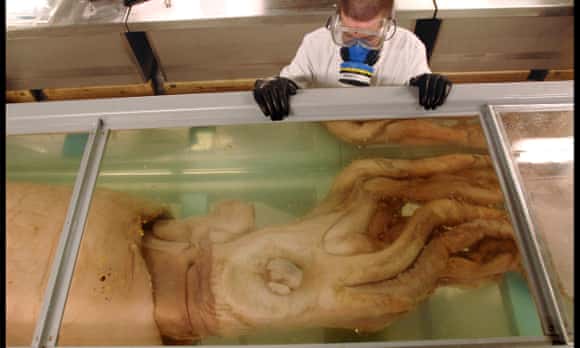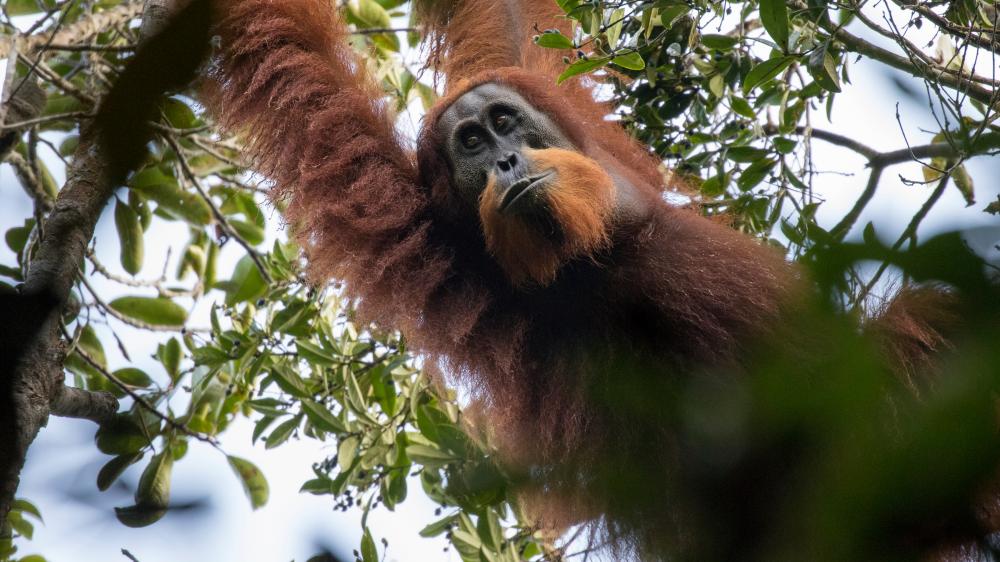 | An alien portal? A grain store? Just a big ol' hole? No: it's Lab notes! |  |  I refuse to listen to your arguments about grain stores: it's a damn stargate and that's the end of it. Shush. Photograph: Nick Brundle Photography/Getty Images
| Tash Reith-Banks
| This week's biggest stories Using muon-detecting sensors, archaeologists have discovered a mysterious void deep within Great Pyramid of Giza. It's the first major structural find since the 19th century and at 30 metres is nearly the same size as the grand gallery, a huge corridor that connects the royal chambers within the pyramid. Exciting is not even the word. Another discovery this week is that, rather unexpectedly, it turns out that there's a third species of orangutan, which scientists have named Pongo tapanuliensis. Sadly, there are fewer than 800, and its survival is already in doubt thanks to illegal trade and habitat loss. A new great ape species is potentially good news for our understanding of evolution – but what about how theories of evolution can contribute to our understanding of life beyond Earth? A team of researchers have been looking at just that, examining at what Darwin's theories can tell us about the potential shape of alien life. Bad news on language evolution for grammar pedants though: resistance to changes in grammar is futile, say researchers. They also say chance plays a bigger role than previously thought in the way language changes. Finally, some worrying news from the British Antarctic Survey (BAS): their research station will have to close for the second winter in a row, as cracks in the ice shelf it stands on have grown. BAS don't want their researchers to get cut off (well, they've probably seen The Thing) so despite having changed location earlier this year, Halley VI station will close again for the winter from March 2018. More news from Guardian Science | Sign up to Lab notes
___ Talking point: rise of the machines |  |  AI isn't all driverless cars and robots that want to take over the world: it's already part of the fabric of our lives. Composite: Guardian design
| Science editor Ian Sample has delved deep into the world of artificial intelligence this week for our series The AI future. It's a look at where AI is currently, where it's set to go and what the implications are ethically and for society as a whole. ___ Straight from the lab – top picks from our experts on the blog network |  |  Giant squid, measuring 8.62m, in a glass tank in the basement at the Natural History Museum, London. Photograph: Martin Godwin for the Guardian
| Searching for the Old Ones: Lovecraftian giant cephalopods and the fossil record | Lost Worlds Revisited Sadly for palaeoartists, Mesozoic encounters between dinosaurs and giant cephalopods were likely to have been extremely rare. A best a dinosaur may have encountered a rotting washed up corpse but there is some evidence of predation by marine reptiles and fish. A specimen of Tusoteuthis gladius with suspected mosasaur tooth marks is housed at the University of Colorado Museum of Natural History as well as an amazing specimen of Cretaceous fish Climolichthys preserved with a Tusoteuthis apparently lodged in its throat (Eyden 2003). Anomalous bottoms at Cern and the case for a new collider | Life and Physics Measurements made by the LHCb experiment at Cern are showing some anomalies which, if confirmed by more data, would signal the breaking point of our most fundamental description of particle physics to date – the Standard Model. Using proton collisions from the LHC, LHCb has been carefully measuring the production of bottom mesons and how often they decay to kaon and muon particles. It looks like the answer is: not nearly often enough! In fact, this decay occurs at only about three-quarters of the frequency predicted by the Standard Model. 'It was a different era': how people understand the concept of time | Brain flapping Analysis reveals studies into our perception of time can vary wildly between experiments and the individuals involved, and many things can alter it, like emotions, or doing things that are particularly stimulating. Seems like time really does fly if you're having fun. Or at least, our awareness of time passing is thrown for a loop. Not that this is unusual, it happens all the time (no pun intended). In truth, on the larger scale, our sense of time is even more malleable. Time seems to go faster as we age, possibly because we have accumulated a lot more memories and familiar routines, meaning our daily lives aren't as stimulating. Visit the Science blog network
___
Science Weekly podcast |  |  How does socioeconomic position affect our health? Photograph: Neil Hall/Reuters
| This week, Ian Sample and Nicola Davis explore the complex relationship between poverty, stress, and life expectancy. ___ Eye on science – this week's top video |  | A close up look at those new orangutans! | | Guardian News & Media Limited - a member of Guardian Media Group PLC. Registered Office: Kings Place, 90 York Way, London, N1 9GU. Registered in England No. 908396 |
| | | |
No comments:
Post a Comment